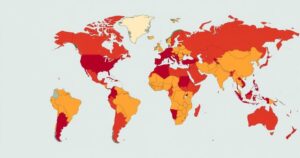Escalating Humanitarian Crises in the Middle East: A Call for Urgent Action

The humanitarian situations in Israel, Gaza, Lebanon, and Sudan continue to deteriorate significantly due to ongoing conflicts. OCHA reports severe civilian suffering, calls for humanitarian assistance, and highlights the urgent need for accountability and protection of vulnerable populations. Increasing displacements, attacks on health infrastructure, and rising fatalities from conflict and disease (such as cholera) are pressing issues demanding immediate international intervention.
The humanitarian crisis in the Middle East continues to escalate dramatically in regions such as Israel, Gaza, Lebanon, and Sudan, amid ongoing hostilities and a dire need for international intervention. The United Nations Office for the Coordination of Humanitarian Affairs (OCHA) has reported on the extensive repercussions faced by civilians due to conflict, particularly the suffering endured following the attack on October 7 in Israel, which initiated significant retaliations in Gaza. Joyce Msuya, the Acting Under-Secretary-General for Humanitarian Affairs, underscored the urgency for humane treatment of hostages, protection of civilians, and accountability for violations of international humanitarian law, calling for an end to military assaults in Gaza. The situation in Gaza remains critically alarming, as evacuation orders have left many north of Wadi Gaza without safe relocation options. As of the latest reports, over 50,000 individuals have been displaced, while numerous families remain trapped, exacerbating the humanitarian crisis. OCHA emphasized that evacuating civilians does not guarantee their safety without provisions for shelter, food, and medical care, further deteriorating the conditions in the region. In Lebanon, the humanitarian circumstances are similarly disheartening, with intensified military actions leading to strikes on healthcare facilities. Reports indicate significant closures of health centers due to hostilities, accounting for over 100 affected facilities since the onset of conflict. Displacements have been recorded, with over 540,000 individuals affected since October of last year. Relief agencies are actively providing food and health services but face challenges due to funding shortages. Meanwhile, in Sudan, a resurgence of conflict has prompted thousands to flee their homes. The World Health Organization (WHO) has raised alerts regarding a cholera outbreak, with many casualties reported amidst worsening conditions. The UN is working diligently to secure humanitarian access, particularly in areas severely impacted by famine and fighting, targeting populations at risk. Overall, the reports underscore a pressing need for coordinated humanitarian responses to alleviate the suffering of affected populations across these crisis regions. OCHA’s efforts, along with various international agencies, strive to provide essential support amidst the challenges posed by ongoing conflicts and limited resources.
The conflicts in Israel, the Occupied Palestinian Territory, Lebanon, and Sudan have led to significant humanitarian crises. In the context of Israel and Gaza, the situation escalated dramatically following an attack on October 7, 2022, which resulted in heavy military responses and widespread civilian suffering. OCHA documents the hardships faced by Palestinians, who are grappling with displacement, lack of resources, and ongoing military action. In Lebanon, persistent military engagement has inflicted heavy damages to civilian infrastructure, particularly health services, exacerbating already challenging living conditions. The humanitarian response is being coordinated by the UN alongside local authorities to offer essential aid. Sudan’s continuous conflict has created a critical environment for its citizens as peace remains elusive. Major health threats, including cholera outbreaks in light of widespread displacements, call for immediate international attention and action.
The article elucidates the grave humanitarian crises unfolding in Israel, Gaza, Lebanon, and Sudan, marked by displacement, lack of essential services, and increasing violence. OCHA and associated humanitarian agencies are actively monitoring the situations and providing assistance where possible, though they face monumental challenges due to hostilities and resource constraints. The international community’s response is crucial to prevent further deterioration of conditions and to uphold the rights and safety of civilians in these conflict-ridden areas.
Original Source: www.unocha.org






